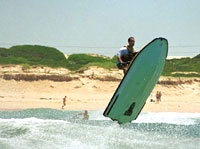Kevin Collins is director of park recreation and use, and acting director of government affairs, at the National Parks Conservation Association.
Monday, 30 Jul 2001
WASHINGTON, D.C.
Drive along the Gulf Coast from Pensacola, Fla., to Gulfport, Miss., and you’ll see a stretch of development filled with casinos, souvenir shops, tattoo artists, and pawnbrokers. You won’t see very much of the natural beauty that once dominated this area, unless you head out to Gulf Islands National Seashore, 136,000 acres of barrier islands, unspoiled beaches, coastal forests, and rich fishing grounds.

Gulf coast scenery.
Photo: Kevin Collins.
I was lucky enough to visit Gulf Islands National Seashore last week as part of my job as director of park recreation and use for the National Parks Conservation Association. NPCA is the only national nonprofit dedicated solely to protecting the natural and cultural treasures that are contained within the U.S. National Park system. NPCA was founded in 1919, just three years after the park system itself. We have 450,000 members around the country who agree that national parks should be preserved unimpaired for future generations.
I was at Gulf Islands because the park staff there has taken the commendable step of announcing they will ban jet skis and other personal watercraft from the park’s waters. Most people agree that these noisy, polluting, high-speed thrill-craft don’t belong in national parks set aside to preserve natural resources. But the personal watercraft industry has been extremely aggressive about fighting National Park Service efforts to restrict these machines. At national parks around the country, the industry has organized its dealers and rental operators to oppose Park Service regulations. I went to Gulf Islands to find a local resident who could spend a few months this summer organizing public support for the ban on jet skis.
Before I tell you more about my trip, let me share some facts about personal watercrafts:
- PWCs are highly polluting. PWCs have two-stroke engines that release up to 30 percent of their fuel/oil mixture directly into the air and water. The California Air Resources Board reports that riding two hours on a 100-horsepower PWC emits as much pollution as driving 139,000 miles in a 1998 passenger car.
Jet skis may be fun to ride, but it is not fun to be subjected to the noise and pollution that they emit. National parks began to have problems with jet skis in the early 1990s. In 1994, Everglades National Park was the first park to prohibit them, because they damaged shallow grass flats and near-shore areas commonly used by birds and fish for feeding and reproduction. As an advocate for the entire National Park System, NPCA supported the Everglades decision but also urged the Park Service to adopt a rule that would cover all parks.

Soon to be history: a jet ski at Gulf Islands National Seashore.
Photo: Kevin Collins.
On 21 Mar. 2000, after receiving 45,000 public comments that supported removing jet skis from national parks, the National Park Service prohibited jet skis from most parks. However, a number of other parks, including National Seashores and National Lakeshores, were left to decide individually whether jet skis should be allowed. Gulf Islands was one of those parks.
In Gulfport, Miss., I found Raines Rushin, a fisher, shrimper, and boater who loves the Gulf Coast — and who believes that personal watercraft don’t belong in Gulf Islands National Seashore. Raines readily acknowledged that he is not a traditional environmentalist. He does, however, agree that jet skis can damage sensitive marine habitats, that they cause conflicts with other users of the water, and that they detract from the special place that is Gulf Islands National Seashore.
Raines agreed to work with NPCA this summer to engage local citizens, businesses, boaters, and public officials in a dialogue about why they should support the Park Service’s decision on jet skis. If our past experience is any guide, he will find a good deal of agreement in the community. By this time next year, the waters of Gulf Islands National Seashore should be cleaner and quieter, and a little more protected for all of us to enjoy.
If you would like a short video that shows some of the serious problems associated with jet skis, just send me an email with your name and address at kcollins@npca.org.

